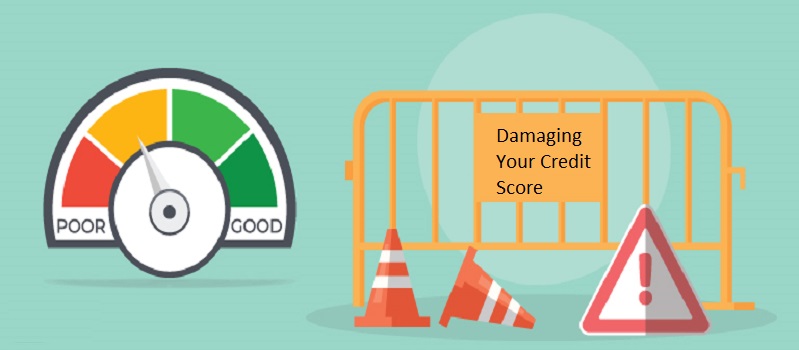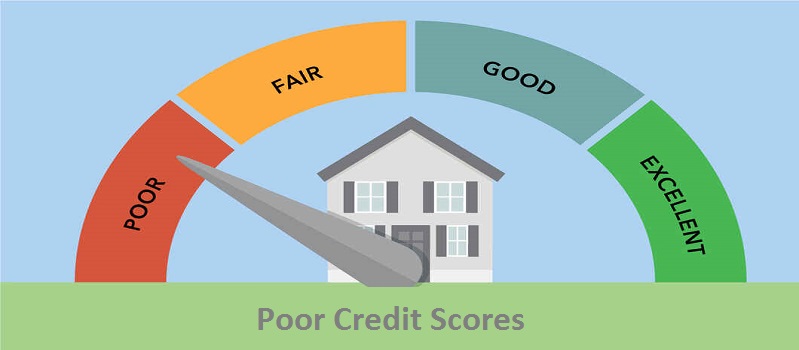Your credit score has a significant role in defining your overall financial health. It determines how much money you will be able to spend on paying interest and fees in your life.
A good credit score will ease you in securing good loans and credit cards at better rates and terms. At the same time, lower credit scores will pose the challenge and will likely cost you more.
Making your credit score worthy
The good thing is that you can control your credit scores up to a limit and progress over time.
But in some cases, there are ways that will hurt your scores without you knowing it and hence are essential to understand. Many people take take out bad credit car finance available on instant decision and go for loans to build up their credit score.
Some practices would hurt your credit score.
1. Exhausting your credit card limits every month
There is a case that you are responsible, and you pay your bills every month on time and never misses out on the payments, but you continue to exhaust your credit card limits every month.
This can become a big problem for your credit score as credit utilization plays an important role (30%) in making up your overall score. Credit score calculations consider the borrowers who are constantly maxing out their card limits as potential risks.
Hence, it is good to keep lower credit card balances and not exhaust your limits every time.
The ideal credit utilization rule says that you should try and keep your credit balance up to 25 to 30% of your total credit limit to achieve the best results and help in improving your credit score.
2. Finishing off your old credit card accounts that you no longer use
The average length of your credit history is another factor that impacts your credit scores and holds about a 15% role in your total score.
It is essential to know and understand that closing the older accounts that are not much in use may seem like a good idea, but be aware that closing all accounts can also reduce the available credit amount with you and hence will surge your utilization.
Instead, consider keeping the old credit card accounts open while keeping those cards in safekeeping. This way, these accounts will add to the average length of your credit history and help you improve your credit score in the longer run.
3. Not checking your credit reports periodically
Identity theft has become common these days, and marketing strategies aiming at consumers leading to such frauds and thefts are on the rise. New account fraud is one of the examples where someone opens an account using your private information.
Checking your credit reports periodically is the best way to know if you are becoming a victim of such theft or fraud and prevent yourself from such misdemeanours.
Failing to do so, you could be an easy victim of theft, and on top of it, you would not even figure out for months or even years. The good thing is that you can now check your credit reports from all the credit reporting agencies once a year from their websites.
4. Getting new credit cards
You might be tempted by the enormous bonuses and rewards you may get with opening new credit cards. There is nothing wrong with making new cards and using them to get rewards.
Whenever you apply for a new credit card, it leads to queries made on your credit report. Using multiple cards sometimes leads to some drop in your overall credit score, which eventually will make it difficult for you to qualify for better rate loans and credits in the future.
5. Becoming a Co-signer for Someone
There is nothing wrong while co-signing for a loan for someone else you know, but it can become a challenge if the person you are betting on doesn’t keep up the promise at their end of the deal.
Remember that when you co-sign for a loan for someone, you also become responsible for the repayment of that loan. If the original borrower of the loan, for any reason, is not able to keep up the promise of repaying the amounts, your credit score will quickly take a hit.
Especially in the scenario when the other person fails to repay the money, your credit score will definitely suffer. Hence this seems another good reason to keep checking your credit reports periodically.
Some people borrow 100% guaranteed car finance from reputed lenders and make their partners co-signer. The option is good but this can become a problem for their partner if the loan is unpaid for the specific duration.
6. Missing on paying bills on time
If you are under the impression that you can delay paying your credit card bills once in a while and it won’t become a big deal, you’re entirely under the wrong impression.
Your payment history is one of the key factors making up your credit scores, contributing about 35% to your total scores. This means, even a single late payment can cause damage to your score. And multiple or repetitive late payments will harm it even more.
It would be best if you do practice paying your credit bills early or at least on time every month. Keep a check or reminder on the date of payment and follow it religiously. If you aren’t taking your bills seriously and delaying paying them on time, you will end you regretting it.
Conclusion
These are a few of the simple mistakes which we have outlined, which happen because of inadequate knowledge and put a dent in your credit score. Treat it with care so that you are likely to benefit from it in terms of getting better loan rates and terms in future.
Some necessary steps that can help you are paying your bills early or on time at max, keeping debt to a minimum, keeping the number of cards limited, and refraining from opening/closing many.

Emma Anderson is a financial advisor at Quickloanslender who always believes in researching hard to know her clients’ financial problems. She takes the time to understand their financial wants and needs to write the blogs on them as the solutions. In her long 14 years of experience, she has written plenty of blogs on the financial and business sectors of the UK.
Emma Anderson has been recognised for her work in financial planning and her blogs are regularly published in the website of Quickloanslender. As far as her educational qualification is concerned, she has done Masters in Accounting and Finance, and done PG Diploma in Creative Writing.






